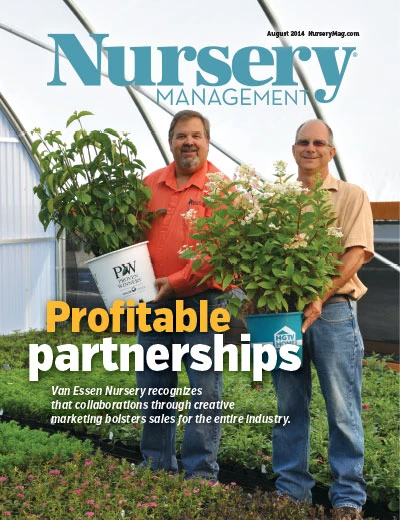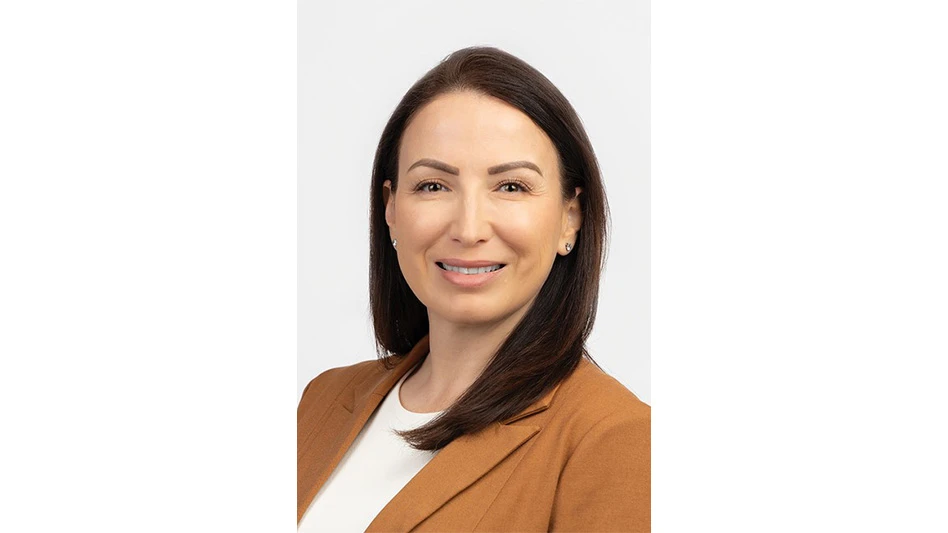
 When times are tough, marketing is typically one of the first line items cut in a budget. This happens despite the fact that many business experts advise that you can gain more of a market share when you increase marketing spend, while everyone else is cutting it. Your company’s presence in the market increases while your competitors’ is decreasing.
When times are tough, marketing is typically one of the first line items cut in a budget. This happens despite the fact that many business experts advise that you can gain more of a market share when you increase marketing spend, while everyone else is cutting it. Your company’s presence in the market increases while your competitors’ is decreasing.
This business differentiation strategy has not been lost on one West Coast nursery. In the early ‘90s, Van Essen Nursery Company did a self-evaluation to better define and build upon the values on which the company was founded. They let their customers be their compass and started a transition from “grow it and they will come” to “tell us how we can partner to help you grow your business and your company brand.”
In the green industry, many companies are still production driven. There are those in the industry that are marketing driven, but other than the “big boys,” it is rare to find a mid-size wholesale nursery thoroughly dedicated to the value of marketing — not only for their own business, but that of their customers. Van Essen is that rare bird.
Early on, keys to differentiation for Van Essen was recognizing the need for diversification in product, which lead them from field to container growing and eventually the creation of their liner division. As the Van Essen identity evolved, they also recognized that their customers’ brands were equally as important. The nursery focused on how they could help their customers by offering niche marketing services.
 Therefore, they created a full-time marketing position in house, which elevated their company profile and allowed them to be quick and nimble with their marketing efforts. Sales and marketing manager Ken McVicker says having someone on staff to provide just-in-time marketing allows them a high degree of flexibility and supports their needs both in-house and out-of-house.
Therefore, they created a full-time marketing position in house, which elevated their company profile and allowed them to be quick and nimble with their marketing efforts. Sales and marketing manager Ken McVicker says having someone on staff to provide just-in-time marketing allows them a high degree of flexibility and supports their needs both in-house and out-of-house.
Van Essen creates a customized and targeted promotional piece for an IGC and sells them the product that it advertises. They’ve also done fence banners, posters and advertising spots for print or digital media. Van Essen offers all types of marketing assistance to any of their customers, small or large, with a creative and quick turn-around.
Limone Horticultural in Teaneck, N. J., is a brokerage company that sells Oregon grown nursery stock. They have benefited from Van Essen’s niche marketing services, including when owner Jerry Limone opened a distribution center in 2011 that focused on selling Oregon plants.
“Van Essen worked with us to provide visual marketing tools that we could distribute as physical documents as well as internet documents,” says Limone. “These tools gave us a professional advantage as the excellence of the work made it possible for us to be seen as an important link to quality West Coast products. And we continue to tap into these services, as it gives us a competitive edge.”
Instead of hiring a graphics company, Van Essen’s in-house marketing department designs their own bi-annual catalog. They also produce trade show promotional items such as posters and banners. Each year at the Farwest Show in Portland, Ore., within two hours of the New Varieties Showcase winner announcement, you’ll find a poster for the winning plants designed, printed and on the show floor in Van Essen’s booth.
Plan ahead
|
Van Essen Nursery Founded: The nursery was started in 1976 by Dave Van Essen on a small patch of ground, with $2,000 cash, a small greenhouse and donated ketchup cans from the local grade school. Location: Lebanon, Ore. Production acreage: 200 acres are devoted to field production, 100 acres to container grown material including 5 acres for liners. Primary products: Van Essen produces over 400 different plant varieties including conifers, flowering shrubs and broadleaf evergreens. Product sales mix: Approximately 90 percent of sales are attributed to finished container and B&B stock while 10 percent is liner sales. Primary customers: Independent garden centers account for approximately 60 percent of Van Essen’s sales, re-wholesalers 35 percent, other wholesale growers 5 percent and the landscape trade is less than 1 percent. Their customer base stretches from coast to coast, including Canada but excluding most southern states. Key staff: Dave Van Essen, owner and general manager, and Ken McVicker, sales and marketing manager, stated that every employee at Van Essen Nursery Company is key as they each bring their own unique skill set to the table which contributes to a unified effort. A majority of their team members have been with the company for 15-20 years. Van Essen’s first full-time employee, Dennis Scott, just retired this year after more than 30 years of dedicated service. |
While it takes time and planning, Van Essen creates a master marketing plan, says McVicker. The nursery builds a calendar which tentatively lays out their plants for the entire year. McVicker says it is only a template, because weather, market demand and other factors can affect what finally comes to fruition. But it still provides a base from which to work.
While marketing helps you stay relevant, owner and general manager Dave Van Essen says producing good quality products is still key. Part of the Van Essen mission is to grow and provide new and tangibly different plants. Van Essen was an early adopter of plant brands, being one of the first propagators for Color Choice Shrubs which eventually became Proven Winners Color Choice. They are key growers for several national brands.
Van Essen and their retail partners recognize that the major plant brands are reaching the end consumer with national advertising. The consumer is always looking for new plants and Van Essen helps fill that need, says Samuel Hoffman, green goods buyer for Weston Nurseries in Hopkinton, Mass. “They always have the newer varieties of plants that are being marketed by the major plant brands. They also bring in the new items before anyone else has them,” Hoffman says.
Filling a need
Besides differentiating through a solid marketing program, Van Essen also diversified the company with the growth of a robust liner division. Since the late ‘90s, Van Essen has devoted more energy to expanding their liner division. They propagate 95 percent of what they produce in finished product. As most nurseries who do their own propagation, they always had excess liners and originally would sell what was left over. When trying to buy in liners to fill holes in their inventory, Dave was frustrated that he could never locate liners as big as his operation would produce and they often weren’t ready on time. Upon reflection, Dave and Ken realized liner growers have to flip their bench space — that is their business. Van Essen’s business is to rotate their finished product area and get their product to market as quick as possible.
Therefore, their goal is to produce a heavier-grade liner that provides a quicker finished crop turn. Determining a market opportunity for their liner production has provided increased sales and has opened the door to an entirely different set of customers. A little over an hour north of Van Essen, you’ll find the largest producer of florist quality azaleas in the United States, Woodburn Nursery & Azaleas of Woodburn, Ore. Woodburn’s other primary product market is ornamental nursery stock. Ron Schmidt, Woodburn’s production manager, says reliability is the name of the game. “Van Essen is everything we look for in a liner supplier; quality and consistency of knowing we can count on receiving our plants from year to year,” Schmidt says.
The key to some of the green industry’s success may be found in the words of the Roman philosopher Titus Maccius Plautus: “You must spend money to make money.” Spending money on marketing and determining your market niche will increase your profits and keep you in business during good times and bad.
|
Go West, young man Dave Van Essen grew up on the family farm in Southwest Minnesota in the town of Edgerton. His parents farmed full time raising hogs, beef cattle, alfalfa and corn. In fact his brother Bob and his family still live and work the property. It was on that family farm that Dave developed his love for agriculture. After earning a two-year Landscape Technology degree at Brainerd Area Vocational Institute in Brainerd, Minn., Dave and some friends traveled to Oregon. He began his post-education career working at a landscape and retail nursery operation in Corvallis. After a year doing landscape installation, he left to do maintenance for the landscape division of the Oregon State Highway Department. His supervisor did plant propagation on the side. This gentleman developed and nurtured Dave’s interest in growing Boxwood. During this time, Dave married his hometown sweetheart, Leanne. She worked at Hewitt Packard as a computer programmer, which enabled him to go in to nursery work fulltime on the 10-acre farm he had purchased. Dave and Leanne have been married 36 years and have five children and one granddaughter. |
Maria Zampini is president of Upshoot LLC and Director of Plant Development and Ornamental Program Manager for the HGTV HOME Plant Collection.

Explore the August 2014 Issue
Check out more from this issue and find your next story to read.
Latest from Nursery Management
- Hold the line!
- Meet the All-America Selections AAS winners for 2025
- Exacto announces David Hollinrake as CEO
- AmericanHort accepting applications for HortScholars program at Cultivate'25
- BioWorks hires Curt Granger as business development manager for specialty agriculture
- 2025 Farwest Show booth applications now open
- Applications open for Horticultural Research Institute Leadership Academy Class of 2026
- Just one shot






